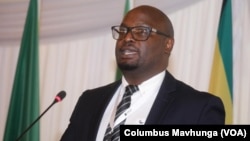Press freedom monitor groups in Africa are worried after an online investigative publication in Zimbabwe said it will halt its coverage of corruption in the army after receiving “threats and direct pressure” from state security agents.
The online publication The NewsHawks said in a statement it will stop pursuing articles on issues of transparency and accountability in the Zimbabwe National Army following “subtle threats and brazen direct pressure from state security agents, particularly military intelligence operatives.”
The publication rankled the army recently when it reported that three senior generals were getting at least $400,000 for housing but still subsidizing themselves through corruption to get upmarket housing in a price range that was above their pay grade.
Friday, officials at The NewsHawks could not be reached for comment on their statement.
Tabani Moyo, director of the Media Institute of Southern Africa, said parties upset with the publication should approach the government-run Zimbabwe Media Commission or the Voluntary Media Council of Zimbabwe if they had issues with journalists’ reportage.
“This is key to us as we believe that the media is a critical pillar of society and its engagement on issues of national importance like accountability, transparency need to be respected as they are provided for by the constitution of the land,” Moyo said.
Men and women in uniform, Moyo added, need to handle the media and not hinder them from performing their watchdog role.
Perfect Hlongwane, secretary general of the Zimbabwe Union of Journalists, said the country had repealed some tough media laws – such as the Access to Information and Protection of Privacy Act, commonly referred to as AIPPA — since President Emmerson Mnangagwa came to power in 2017.
Hlongwane said with the reported threats to The NewsHawks, the country might be headed toward dark days for the media.
“Our concern is that we may be regressing as a country having managed to record so much positive reform within the media space under the Second Republic,” Hlongwane said. “We saw quite a number of changes where we saw some laws such as AIPPA being repealed. We hope [authorities] will not ignore the fundamental rights and freedoms of the media to operate without any kind of gagging and our trust has always been to engage. And we shall continue to pursue that.”
Zimbabwe officials did not respond to requests for interviews by VOA.
Presidential spokesman George Charamba was quoted in a government-controlled daily newspaper this week saying the army had zero tolerance for corruption. However, he added, the government “notes with concern attempts by The [News]Hawks and other media outlets to peddle” what he called falsehoods.





